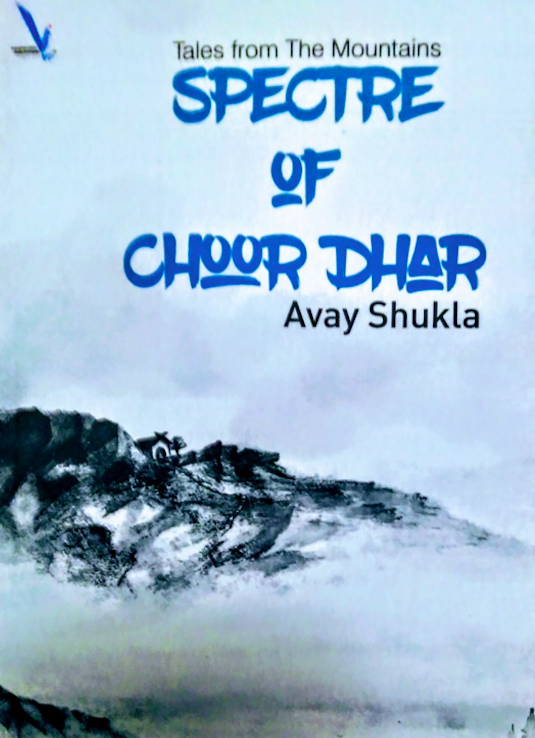Avay Shukla writes with a flair which is unmatched. A true Nature Lover, the ten stories in his book, ‘Spectre of Choor Dhar’, weave a magic tapestry with words that transmute ordinary natural scenery to scenes of wonderment.
The raconteur is Onkak Yadav, the retired Chief Secretary, better known as the Collector, who lives in his cottage at Namhol village. The setting is the Officers’ Club in the district headquarters of Bilaspur town near Shimla. The motley crowd consists of the District Collector, the Sub Divisional Magistrate, an IAS Probationer, the Executive Engineer, the Chief Medical Officer, sometimes the Superintendent of Police and a businessman or two. To this assorted crowd, the Collector recounts his tales of yore, enlightening them about places, myths, proclivities and a few home truths.

The writer’s choice of words marvellously echoes the scenery that he describes. Early in his first story he writes, “Bilaspur’s USP, however, is the picturesque Gobindsagar lake, curling around the town in a loving embrace as if loath to part with its companion of centuries past.” A little later in the same story, describing the avalanche of rain, he says, “Claps of thunder blasted the stillness and echoed around the crags like some menacing symphony. The whole atmosphere was still and inert as if waiting for the arrival of some primordial force. And then the force arrived – huge dollops of rain cascaded down in their millions of litres …..”
The writer’s knowledge of his locale is astonishing. Every trek worth knowing in the state of Himachal Pradesh is listed. Every mountain and valley and stream is mapped out. In ‘The Lost Treasure of Dibbi Bokri’, he writes, “The Parbati river, as you know, originates from the glacial Mantalai lake just below the Pin Parbat range …… It cascades furiously down its narrow, thickly forested, habitation-less valley …. before it confluences with the Tosh stream at the village of Pulga.” In ‘The Devta of Jiwa-Nal’, the local legend of the Pandavas’ wanderings in the upper reaches of the state is peppered with accurate descriptions of the locale.
Each story has an element of palpable suspense. In ‘The Judgement’, till almost the last paragraph we do not know how the wily judge will negotiate between the twin dangers of Scylla and Charybdis, between the death sentence and life imprisonment, while fulfilling his bounden duty with the utmost regard to rectitude and fair play. The ending of ‘Ambush At Chanshil Pass’ is chilling while that of ‘The Lost Treasure Of Dibbi Bokri’ and ‘The Spectre Of Choor-Dhar’ are both Hitchcockian. Equally unexpected is the way the lanky, expressionless, penitent representative from the Naxalite region is dealt with in the ‘The Midnight Visitor’.
Cynicism is the leitmotif in ‘The Cave Man Of Sainj Valley’, the background being the Teachers Awards Day. The Collector laments that, “It’s sycophancy and networking that brings awards”. Be it the Republic Day or Independence Day Awards, or even the Teachers’ Day Awards, the rule is, the more senior the more awards. The misandry and political give-and-take forms the core of the story, ‘The National Park’, so reminiscent of the hilarious but cynical BBC serials, ‘Yes Minister’ and ‘Yes Prime Minister’.
As the writer confesses in his ‘Introduction’, “… his stories reveal everything about him”. His love for the outdoors and for long, lonely, arduous treks, his intense passion for Nature, his utter and unwavering belief in Destiny, are all there splashed across his ten stories. The last tale, ‘The House That Died Of Grief’, is an intensely personal slice of the author’s life. Yet, there is no rancour or bitterness at the way things are. Rather, there is a certain mirth, a certain joy mingled with a grin and an indulgent smile at the varied and multilayered dimensions of life in this world of ours.
At times, the reader may feel bogged down by the language used by the Collector while narrating his anecdotes. Then again, how else will a retired bureaucrat speak but in measured tones, using words which the assembled crowd of district officials encounter in their daily grind of officialdom. They don’t bat an eyelid …. and neither should you.
Editors Note:
About the author:

Anil Pradhan, an alumni of Hindu College – Delhi, is a former IPS officer. He retired as the Director General of Police, Meghalaya.



